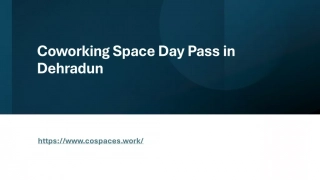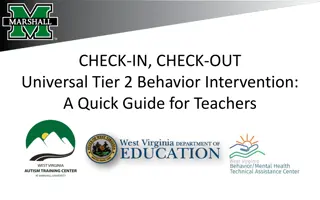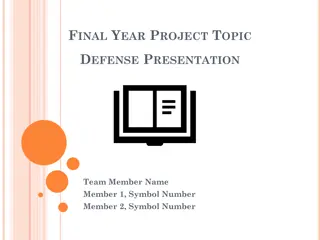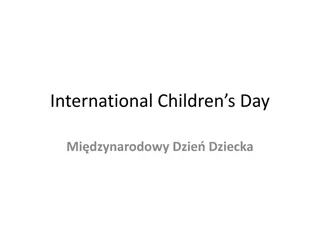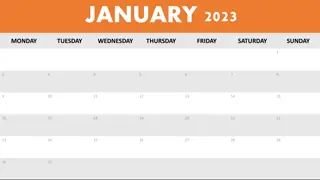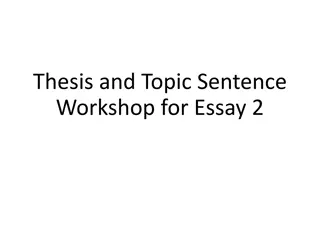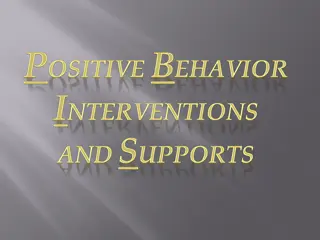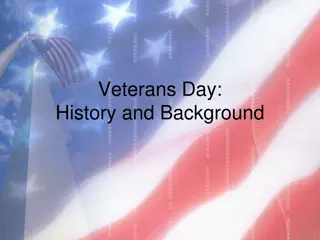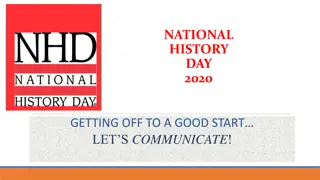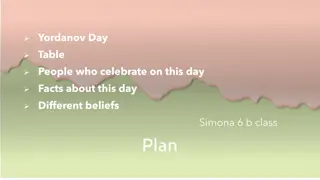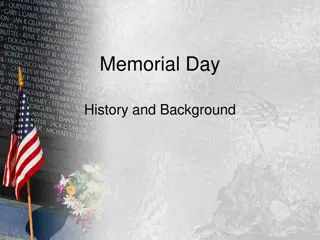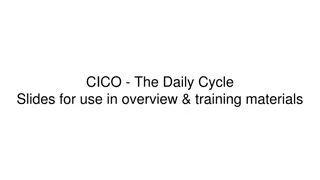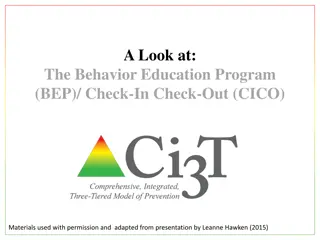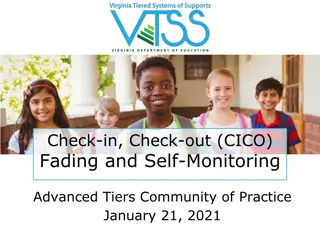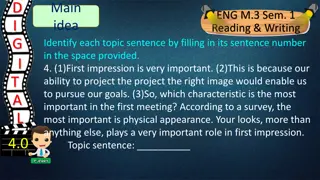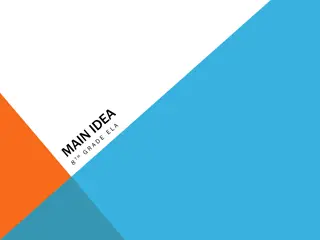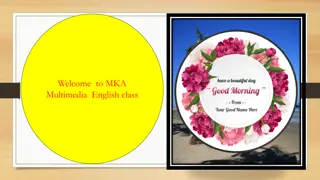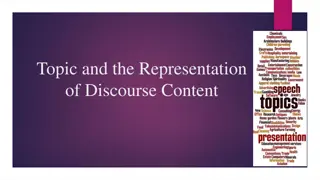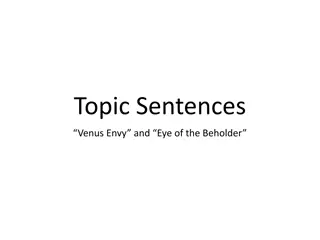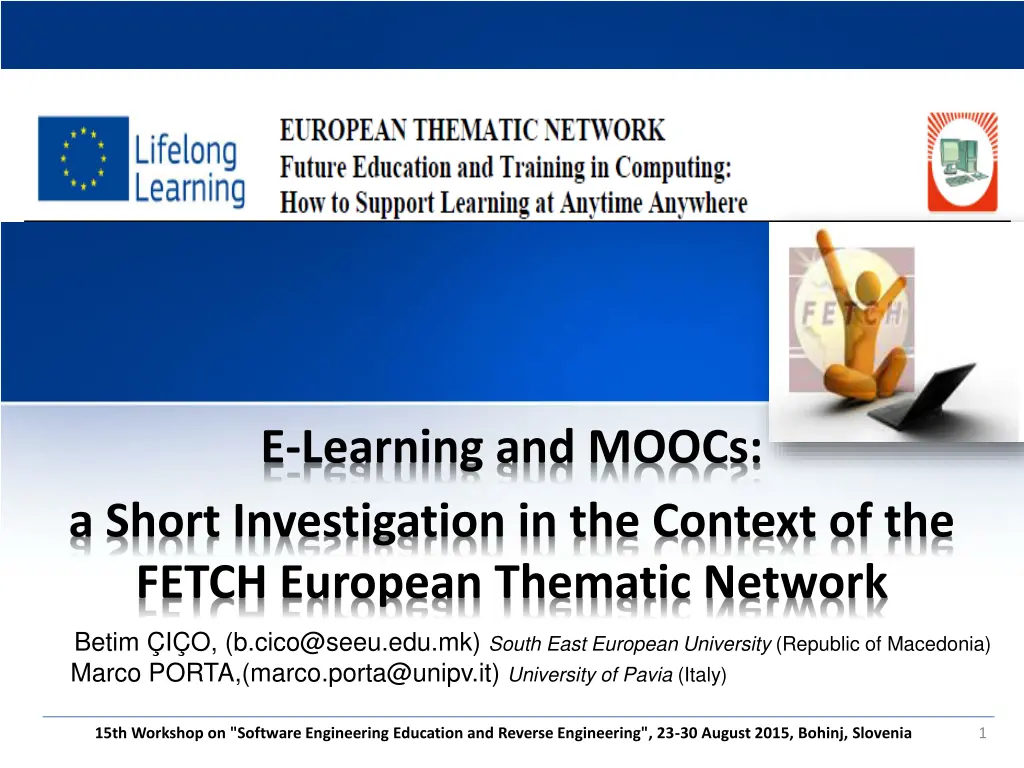
Investigation on E-Learning and MOOCs in FETCH European Thematic Network
Explore the investigation into E-Learning and MOOCs conducted within the FETCH European Thematic Network, covering motivation, questionnaires, responses, discussions, and conclusions from the 15th Workshop on Software Engineering Education and Reverse Engineering in Slovenia, 2015.
Download Presentation

Please find below an Image/Link to download the presentation.
The content on the website is provided AS IS for your information and personal use only. It may not be sold, licensed, or shared on other websites without obtaining consent from the author. If you encounter any issues during the download, it is possible that the publisher has removed the file from their server.
You are allowed to download the files provided on this website for personal or commercial use, subject to the condition that they are used lawfully. All files are the property of their respective owners.
The content on the website is provided AS IS for your information and personal use only. It may not be sold, licensed, or shared on other websites without obtaining consent from the author.
E N D
Presentation Transcript
E-Learning and MOOCs: a Short Investigation in the Context of the FETCH European Thematic Network Betim I O, (b.cico@seeu.edu.mk) South East European University(Republic of Macedonia) Marco PORTA,(marco.porta@unipv.it)University of Pavia (Italy) 15th Workshop on "Software Engineering Education and Reverse Engineering", 23-30 August 2015, Bohinj, Slovenia 1
Outline MOTIVATION Introduction THE QUESTIONNAIRES AND RESPONSES E-learning MOOCs DISCUSSION and Remarks CONCLUSIONS 15th Workshop on "Software Engineering Education and Reverse Engineering", 23-30 August 2015, Bohinj, Slovenia 2
Motivation The investigation was carried out in the context of the FETCH European Thematic Network: Future Education and Training in Computing: How to support learning at anytime anywhere http://fetch.ecs.uni-ruse.bg/?cmd=gsIndex WP -3 TASK T1: Defining best curricula and syllabi for bachelors, masters and doctorates in CS, CE, SE and IS, as well as for their implementation in higher education institutions; Establishing best teaching modalities. 15th Workshop on "Software Engineering Education and Reverse Engineering", 23-30 August 2015, Bohinj, Slovenia 3
Motivation To present the results of an online survey on e- learning and MOOCs Four areas: Computer Science (CS) Computer Engineering (CE) Software Engineering (SE) Information Systems (IS) Three categories of respondents: Professors http://goo.gl/fsNbHS Alumni http://goo.gl/EkH9Ch Industry Representatives http://goo.gl/sfjF2x 15th Workshop on "Software Engineering Education and Reverse Engineering", 23-30 August 2015, Bohinj, Slovenia 4
Motivation Work packages, Summary of work packages of the FETCH WP number Work package type Workpackage title 1 Management Project Management & Coordination 2 Implementation National and European frameworks for development of Higher Education until 2020 Implementation European Strategic Framework for Computing Education and Training 2020 Implementation European Evaluation Framework in Computing Education and Training 2020 Implementation Digital curricula in Computing Education and Training 3 4 5 6 Implementation e-Learning and m-Learning in Computing supported by social media 7 Quality Assurance Exploitation of results Dissemination Quality Assurance 8 Exploitation of Project Results 9 Dissemination of Project Results 15th Workshop on "Software Engineering Education and Reverse Engineering", 23-30 August 2015, Bohinj, Slovenia 5
Introduction E-learning, main features: Usually tailored to the student (instead of being characterized by the class) The student has more control over topics (instead of subjects and rules being selected by the teacher) Takes place when the student prefers (instead of being constrained by predefined timetables) The teaching procedure occurs mainly by means of technology (instead of depending on the teacher s will and competence) Students act a proactive role (instead of playing a reactive role) 15th Workshop on "Software Engineering Education and Reverse Engineering", 23-30 August 2015, Bohinj, Slovenia 6
Introduction Some challenges: Motivation Time management Learning how to learn in a virtual environment Assessments 15th Workshop on "Software Engineering Education and Reverse Engineering", 23-30 August 2015, Bohinj, Slovenia 7
Introduction Massive Open Online Courses (MOOCs) Share some of the principles of ordinary courses Are taught over the Web to a very large number of students Usually have no fees No specific prerequisites No predefined expectations No formal accreditation 15th Workshop on "Software Engineering Education and Reverse Engineering", 23-30 August 2015, Bohinj, Slovenia 8
Introduction Some challenges: Handling course delivery for thousands of students at the same time entails a revision of the usual tutor- assisted e-learning model Need for automated tools able to balance the lack of human attention Scalability problems 15th Workshop on "Software Engineering Education and Reverse Engineering", 23-30 August 2015, Bohinj, Slovenia 9
QUESTIONNAIRES AND RESPONSES Professors: 95 responses from 18 countries almost all public universities or higher education organizations MOOCs offered by very few respondents institutions (10) Alumni 69 responses from 15 countries Industry representatives 35 responses from 13 countries 15th Workshop on "Software Engineering Education and Reverse Engineering", 23-30 August 2015, Bohinj, Slovenia 10
..questionnaires: e-Learning . Professors, alumni and industry representatives all largely agree that e-learning: is useful for both bachelor's and master's programs is useful for PhD programs, although a little less markedly should not be used as the only teaching modality (it should be combined with "traditional" learning) Respondents were asked to rate, in a scale from 0 to 4, the benefit levels of some features of e-learning 15th Workshop on "Software Engineering Education and Reverse Engineering", 23-30 August 2015, Bohinj, Slovenia 11
..questionnaires: e-Learning . 15th Workshop on "Software Engineering Education and Reverse Engineering", 23-30 August 2015, Bohinj, Slovenia 12
..questionnaires: e-Learning . 15th Workshop on "Software Engineering Education and Reverse Engineering", 23-30 August 2015, Bohinj, Slovenia 13
..questionnaires: e-Learning . 15th Workshop on "Software Engineering Education and Reverse Engineering", 23-30 August 2015, Bohinj, Slovenia 14
..questionnaires: e-Learning . 15th Workshop on "Software Engineering Education and Reverse Engineering", 23-30 August 2015, Bohinj, Slovenia 15
..questionnaires: e-Learning . 15th Workshop on "Software Engineering Education and Reverse Engineering", 23-30 August 2015, Bohinj, Slovenia 16
..questionnaires: e-Learning . 15th Workshop on "Software Engineering Education and Reverse Engineering", 23-30 August 2015, Bohinj, Slovenia 17
..questionnaires: e-Learning . Respondents were also asked to rate, in a scale from 0 to 4, the challenges posed by e-learning. 15th Workshop on "Software Engineering Education and Reverse Engineering", 23-30 August 2015, Bohinj, Slovenia 18
..questionnaires: e-Learning . 15th Workshop on "Software Engineering Education and Reverse Engineering", 23-30 August 2015, Bohinj, Slovenia 19
..questionnaires: e-Learning . 15th Workshop on "Software Engineering Education and Reverse Engineering", 23-30 August 2015, Bohinj, Slovenia 20
..questionnaires: e-Learning . 15th Workshop on "Software Engineering Education and Reverse Engineering", 23-30 August 2015, Bohinj, Slovenia 21
..questionnaires: e-Learning . 15th Workshop on "Software Engineering Education and Reverse Engineering", 23-30 August 2015, Bohinj, Slovenia 22
..questionnaires: e-Learning . 15th Workshop on "Software Engineering Education and Reverse Engineering", 23-30 August 2015, Bohinj, Slovenia 23
..questionnaires: e-Learning . 15th Workshop on "Software Engineering Education and Reverse Engineering", 23-30 August 2015, Bohinj, Slovenia 24
Questionnaires: MOOCs 15th Workshop on "Software Engineering Education and Reverse Engineering", 23-30 August 2015, Bohinj, Slovenia 25
Questionnaires: MOOCs 15th Workshop on "Software Engineering Education and Reverse Engineering", 23-30 August 2015, Bohinj, Slovenia 26
Questionnaires: MOOCs 15th Workshop on "Software Engineering Education and Reverse Engineering", 23-30 August 2015, Bohinj, Slovenia 27
Questionnaires: MOOCs 15th Workshop on "Software Engineering Education and Reverse Engineering", 23-30 August 2015, Bohinj, Slovenia 28
DISCUSSION Some Remarks The percentages of the three categories of respondents who agreed on the good qualities of e-learning are very similar in most cases > 75% (levels 3+4 together) the actual or potential advantages of e-learning are well acknowledged by both the academic world and its users (i.e. students and their prospective employers) 15th Workshop on "Software Engineering Education and Reverse Engineering", 23-30 August 2015, Bohinj, Slovenia 29
DISCUSSION Some Remarks Also the percentages of the three categories of respondents who agreed on the challenges of e- learning are similar, with two exceptions: Potential low student completion rate: about 46% of alumni (levels 3+4) consider it a real problem, as opposed to about 37% of professors and 25% of industry representatives . Need for technical and pedagogical training for students: about 46% of alumni and 48% of industry representatives consider it an actual issue, while only about 36% of professors think it is a problem. 15th Workshop on "Software Engineering Education and Reverse Engineering", 23-30 August 2015, Bohinj, Slovenia 30
DISCUSSION Some Remarks Alumni are generally better disposed than professors and industry representatives towards MOOCs The fact that with MOOCs it is possible to access quality courses from top universities across the world is very appreciated by all three categories of respondents The fact that MOOCs provide only "certificates" to students rather than university credits is considered a problem by about 40% of industry representatives, as opposed to about 56% of professors and 52% of alumni 15th Workshop on "Software Engineering Education and Reverse Engineering", 23-30 August 2015, Bohinj, Slovenia 31
CONCLUSION Limitations of the Study Relatively low number of respondents for the three categories (95, 69 and 35, respectively) Bias due to the fact that respondents are not uniformly distributed among countries The study is more qualitative study than statistical 15th Workshop on "Software Engineering Education and Reverse Engineering", 23-30 August 2015, Bohinj, Slovenia 32
CONCLUSION Nevertheless, we think that it can provide some basic insights for a future. More thorough (cross comparative) analysis of the perception of good and bad qualities of e-learning and MOOCs within the three groups. 15th Workshop on "Software Engineering Education and Reverse Engineering", 23-30 August 2015, Bohinj, Slovenia 33
Thank you Questions , Comments and Suggestions are welcomed! 15th Workshop on "Software Engineering Education and Reverse Engineering", 23-30 August 2015, Bohinj, Slovenia 34

